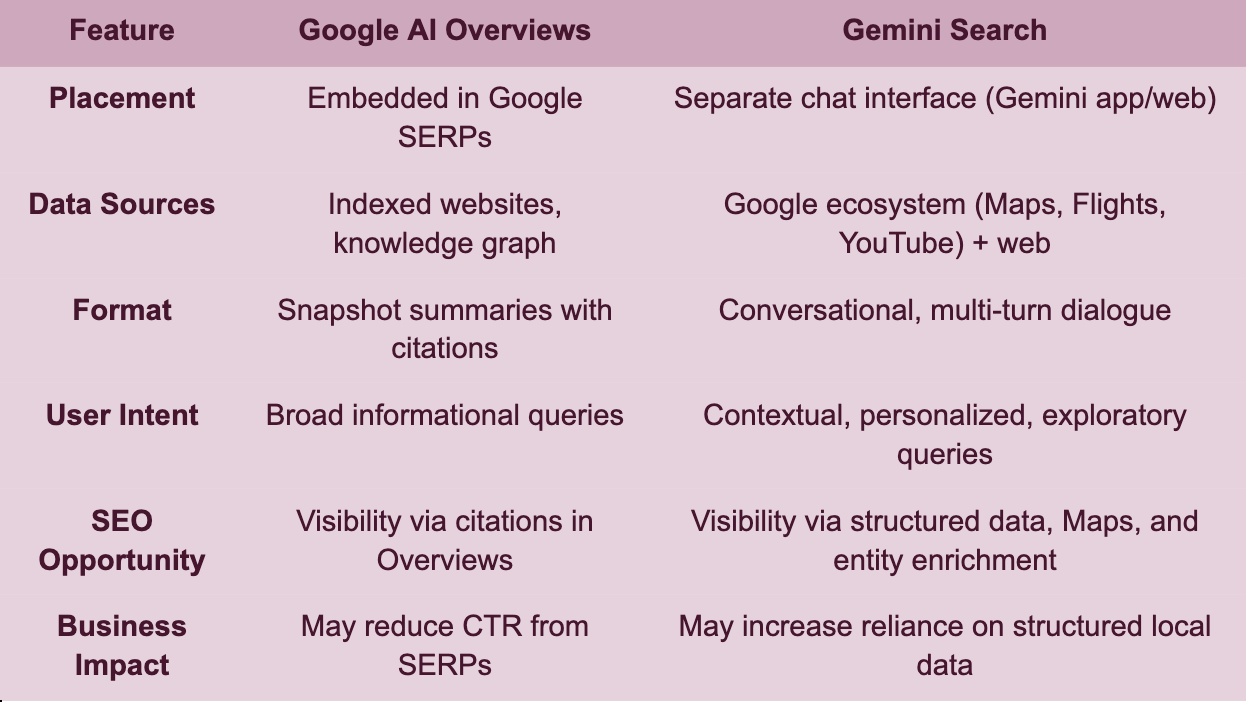When Google rolled out AI Overviews in 2024, it marked a major shift in how search results are displayed. Instead of just showing blue links, Google began using generative AI to summarize answers directly on the results page. Around the same time, Google also launched Gemini, its flagship Large Language Model (LLM) and AI assistant.
For SaaS SEO providers serving multi-location brands, the overlap between AI Overviews and Gemini raises an important question: What’s the difference, and how should brands optimize for each?
Understanding Google AI Overviews
AI Overviews are generative summaries embedded directly into Google’s Search Results Pages (SERPs). They appear above or alongside traditional organic results, especially for complex, multi-part questions.
Key characteristics of AI Overviews:
- Source-based answers: Overviews pull from multiple indexed web sources, citing snippets and links.
- Query focus: Designed for broad or complex search queries (e.g., “What’s the best way to train for a marathon in hot weather?”).
- SEO impact: Businesses may gain visibility if their content is cited in the overview—but may also lose traffic since answers are shown without requiring a click.
- Scope: Overviews are tied to Google’s traditional search index and knowledge graph.
For local businesses, this means AI Overviews may highlight review snippets, directories, or aggregator content—not always the brand’s own site.
Understanding Gemini Search
Gemini is Google’s conversational AI model, integrated into its chatbot interface (formerly Bard) and connected to apps like Gmail, Maps, and YouTube.
Key characteristics of Gemini Search:
- Conversational experience: Users interact in a chat-style interface instead of scanning SERPs.
- Multi-modal capabilities: Gemini handles text, images, maps, and in some versions, video.
- Contextual queries: Gemini understands intent more deeply, parsing conversational and follow-up questions.
- Cross-app integration: It pulls data not just from the web, but from Google Maps, Google Flights, and other Google services.
For local SEO, Gemini can respond to queries like:
- “Which Italian restaurants near me are open past 10?”
- “Show me family-friendly hotels within walking distance of Central Park.”
Here, Gemini combines LLM reasoning with Google’s structured datasets.
The Core Differences

| Feature | Google AI Overviews | Gemini Search |
| Placement | Embedded in Google SERPs | Separate chat interface (Gemini app/web) |
| Data Sources | Indexed websites, knowledge graph | Google ecosystem (Maps, Flights, YouTube) + web |
| Format | Snapshot summaries with citations | Conversational, multi-turn dialogue |
| User Intent | Broad informational queries | Contextual, personalized, exploratory queries |
| SEO Opportunity | Visibility via citations in Overviews | Visibility via structured data, Maps, and entity enrichment |
| Business Impact | May reduce CTR from SERPs | May increase reliance on structured local data |
Why This Matters for Multi-Location SEO
AI Overviews and Gemini coexist but serve different discovery paths:
- AI Overviews → your brand competes to be cited as a trusted source in SERPs.
- Gemini → your brand competes to be recommended conversationally, often based on Maps, reviews, and structured attributes.
For SaaS SEO providers, this means strategies must adapt:
- Content-first for AI Overviews: Create authoritative, trustworthy, and source-citable content.
- Data-first for Gemini: Ensure business listings, attributes, and schema markup are consistent across Google’s ecosystem.
Challenges for Providers
- Visibility uncertainty: AI Overviews don’t always cite sources, and Gemini doesn’t always reveal where results come from.
- Click-through erosion: Summarized results mean fewer clicks to brand websites.
- Ecosystem sprawl: Brands must now optimize across SERPs, Gemini, Maps, and potentially other AI-first platforms.
How SaaS SEO Providers Can Prepare
1. Optimize for AI Overviews
- Create content hubs around key topics.
- Ensure expertise, authoritativeness, and trustworthiness (E-E-A-T).
- Track when/if client content is cited in Overviews.
2. Optimize for Gemini
- Fully optimize Google Business Profiles for every location.
- Add structured schema markup for services, menus, products, and hours.
- Encourage review content with descriptive language (Gemini parses review semantics).
- Test queries in Gemini to see how and when clients appear.
3. Syndicate Beyond Google
Since Gemini and AI Overviews both pull from multiple data ecosystems, ensure listings are syndicated across directories that AI engines can index. Tools like Ezoma make this scalable.
How can EZOMA help here?
Ezoma helps SaaS SEO providers prepare multi-location brands for both AI Overviews and Gemini by:
- Syndicating structured, enriched listings across 100+ platforms.
- Ensuring business data is AI-readable and consistent across Google Maps, directories, and web sources.
- Providing visibility insights into where clients appear in AI-driven results.
By bridging the gap between content visibility (AI Overviews) and data visibility (Gemini), Ezoma ensures multi-location brands remain discoverable across both search experiences
AI Overviews and Gemini may sound similar, but they represent two distinct entry points into Google’s AI ecosystem. One summarizes the web for traditional searchers, while the other engages users in conversational, contextual discovery.
For SaaS SEO providers, the future of optimization means preparing clients for both worlds:
- Competing to be cited in AI Overviews.
- Structuring data to surface in Gemini.
Those who master both will secure visibility for their clients across Google’s evolving search landscape.


